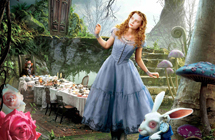这些英语中的常用语,都是因为一本童话流行起来的
|
1. DOWN THE RABBIT HOLE Down the rabbit hole is a metaphor for adventure into the unknown. This phrase “started appearing almost immediately after the book was first published” in 1865, says Carolyn Vega, curator of the Morgan Library’s exhibit "Alice: 150 Years of Wonderland". Down the Rabbit Hole实际上是书中第一章节的标题。主人公爱丽丝因为追赶一只揣着怀表、会说话的白兔,掉进了一个兔子洞,由此坠入了神奇的地下世界。 2. MAD AS A HATTER Mad as a hatter is to suggest that a person is suffering from insanity. The phrase had been in use since 1835 to describe an unusual medical condition affecting hat manufacturers. In 18th and 19th century England mercury was used in the production of felt, which was used in the manufacturing of hats common of the time. 一些帽子手工匠因长期接触含汞织物而发生汞中毒,口齿不清、战栗、步履蹒跚、甚至失去意识,而人们就用mad as a hatter来形容出现这类症状的人。 这种说法流传至今离不开卡罗尔这个营销天才。Hatter是《爱丽丝梦游仙境》中的一个角色,擅长制帽与剪裁。由于他性格怪诞、疯癫,也被书迷称为Mad Hatter,“疯帽子”。 “He was the first children’s book author to license his characters for use on other products, so the characters had individual lives,” says Vega, “The characters become familiar to a group of people wider than the readership of the book.” 3. CHESHIRE CAT GRIN Much as with our buddy the Mad Hatter, the Cheshire Cat has been ingrained in the membrane. The adjectival phrase is, once again, associated with a specific character. So whenever someone describes a person as grinning like a Cheshire cat, we can picture that huge, mischievous—and slightly unsettling—smile. 4. OFF WITH THEIR HEADS! “红心王后”性格跋扈残暴,统治残暴,成天叫嚷着“砍掉他们的脑袋”(Off with their heads!)。 Sure, Shakespeare scribbled it first—but Carroll’s Queen of Hearts certainly popularized the imperative. 现在,人们经常用这句话开玩笑,表示想要除掉那些有问题的人。 5. TWEEDLEDEE AND TWEEDLEDUM From the 1871 sequel, Through the Looking-Glass, and What Alice Found There, this one’s particularly useful for playground battles, presidential campaigns, and Halloween. Tweedle-Dee和Tweedle-Dum实际上是《爱丽丝镜中奇遇记》中的一对双胞胎。 6. JABBERWOCKY Prior to its 1871 print debut, jabberwocky was a nonsense word that served as the nonsense title of a nonsense poem in Through the Looking-Glass. Now, it’s a real entry in the real dictionary that really means “meaningless speech.” |









